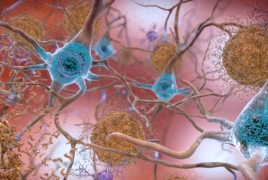
Recent research has found that short daily practice of mind-body therapy may help alleviate some of the signs and symptoms that often precede dementia, Medical News Today.
The researchers behind the new study assessed a group of older adults experiencing memory difficulties who practiced 12 minutes per day of music listening or simple yoga meditation for 12 weeks.
Samples of their blood from before and after the 3 months of therapy revealed changes in levels of certain markers with associations to cell aging and Alzheimer's disease.
These changes also linked directly to improvements in subjective assessments of cognitive function, mood, sleep, and quality of life.
Dr. Kim Innes, a professor at West Virginia University School of Public Health in Morgantown, led the study and is first author of the study paper, which features in the Journal of Alzheimer's Disease.
The team chose to measure a number of blood markers that "have emerged as possible predictors of cognitive decline and dementia." These included telomere length, telomerase activity, and levels of certain beta-amyloid peptides with links to Alzheimer's disease.
Telomeres are "protective caps" that work to prevent the ends of chromosomes from deteriorating. Telomerase is an enzyme that helps preserve telomere length. Reduction in telomere length and telomerase activity are both "markers of cellular aging."
Symptoms of Alzheimer's disease, such as a gradual decline in the ability to remember, think, and make decisions, emerge long after the changes in the brain that cause them have already taken hold.
For this reason, and because of the difficulties of diagnosing this form of dementia from symptoms, researchers are pushing for a model that "defines Alzheimer's by brain changes, not symptoms."
They argue that this would help clinicians diagnose Alzheimer's much earlier and give therapies a chance to make a real difference in delaying, if not averting, the debilitating symptoms.
One change that often occurs in the brains of people with Alzheimer's disease is clumps of beta-amyloid protein. Whether these beta-amyloid clumps in the brain cause the disease or just accompany it, and how they relate to blood levels of the protein, is not entirely clear.
Scientists are, however, becoming increasingly confident that a blood test based on beta-amyloid markers will one day be able to predict Alzheimer's long before symptoms such as memory loss and confusion emerge.

